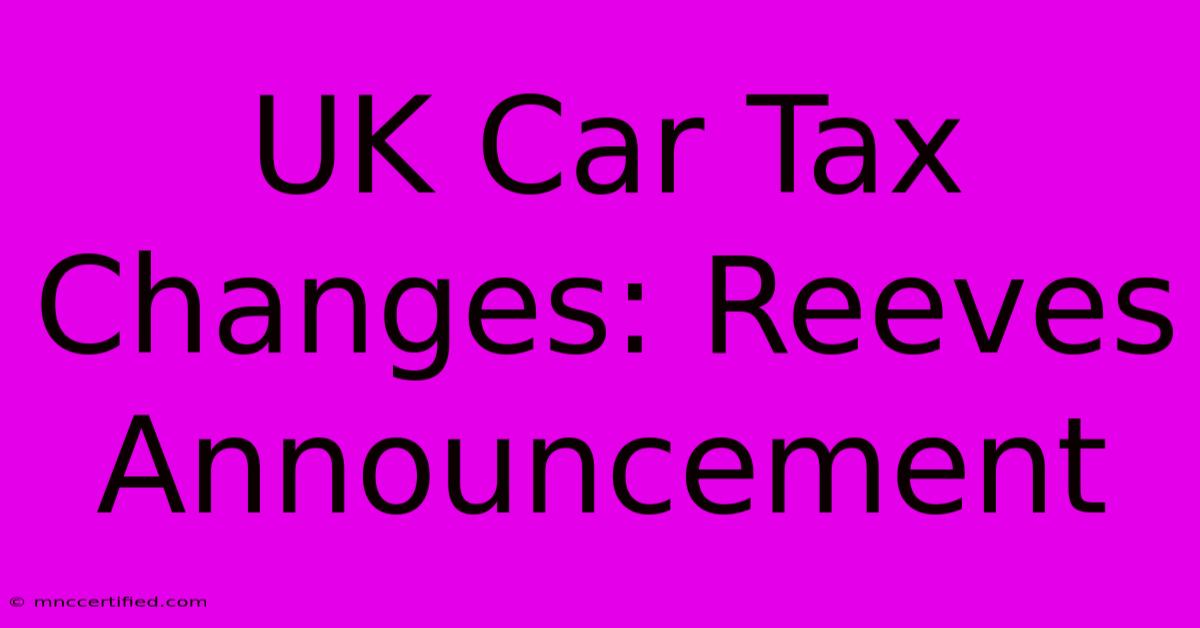UK Car Tax Changes: Reeves Announcement

Table of Contents
UK Car Tax Changes: Reeves' Announcement – What You Need to Know
The UK's car tax system is set for a shake-up following Chancellor Jeremy Hunt's Autumn Statement 2022 and subsequent announcements. While not as drastic as some feared, the changes still impact drivers and the automotive industry. This article breaks down the key announcements, explaining what they mean for you and how to prepare.
Key Changes Announced by Jeremy Hunt
The most significant change revolves around the freeze on vehicle excise duty (VED), commonly known as car tax. This freeze, originally planned until 2028, has been extended, impacting both new and used car purchases. This means that the current VED rates will remain unchanged for longer than previously anticipated. This is a significant departure from previous plans for potential increases.
While the VED rates themselves aren't changing, the implications are still noteworthy. Let's unpack what this means:
Impact on New Car Buyers
For those planning to buy a new car, the frozen VED rates offer a degree of cost certainty. You can budget more accurately, knowing the car tax liability won't increase unexpectedly during the next few years. However, remember that other costs, such as fuel prices and insurance premiums, remain subject to market fluctuations.
Impact on Used Car Buyers
The extended freeze also benefits used car buyers. The cost of owning a used car is partially determined by the VED. A stable tax rate provides predictability and can influence used car pricing. However, remember that the overall cost of ownership also includes factors like maintenance, repairs, and depreciation.
Implications for the Automotive Industry
The prolonged VED freeze provides a degree of stability for the automotive industry. Predictable tax rates can facilitate better planning for manufacturers and dealers. This predictability is beneficial for long-term investment and business strategy. However, the industry is still contending with other challenges, such as the transition to electric vehicles and the global chip shortage.
Beyond the VED Freeze: Other Relevant Factors
While the VED freeze is the headline announcement, several other factors influence the overall cost of car ownership in the UK:
- Fuel Prices: Fluctuations in fuel prices significantly impact running costs. Consider fuel efficiency when choosing a vehicle.
- Insurance Premiums: Insurance costs vary greatly depending on factors like age, driving history, and vehicle type. Shop around for the best deals.
- Road Tax Alternatives: Explore alternatives like car sharing schemes or public transportation to minimize overall transportation costs.
- Electric Vehicle Incentives: The government continues to offer incentives for electric vehicle purchases, potentially offsetting some of the initial higher purchase price.
Preparing for the Future: Tips for UK Drivers
Regardless of the VED freeze, responsible car ownership requires careful planning:
- Budgeting: Accurately budget for all running costs, including fuel, insurance, maintenance, and VED.
- Vehicle Choice: Consider fuel efficiency and overall running costs when choosing a vehicle.
- Regular Maintenance: Regular maintenance helps prevent costly repairs in the long run.
- Insurance Comparison: Compare insurance quotes from different providers to find the best deal.
Conclusion: Navigating the UK Car Tax Landscape
The extended freeze on car tax provides a degree of welcome certainty for UK drivers. However, responsible car ownership still requires careful consideration of various costs. Staying informed about government announcements and planning ahead will help you navigate the UK car tax landscape effectively. Remember to factor in all associated costs, not just the VED, for a realistic assessment of your vehicle's total cost of ownership. This will allow for more informed decision-making when buying or keeping a car in the UK.

Thank you for visiting our website wich cover about UK Car Tax Changes: Reeves Announcement. We hope the information provided has been useful to you. Feel free to contact us if you have any questions or need further assistance. See you next time and dont miss to bookmark.
Featured Posts
-
Menendez Brothers Hearing Delayed To January
Nov 26, 2024
-
Celtics Ultra Clutch Time How To Improve
Nov 26, 2024
-
Adeles Next Chapter After Las Vegas
Nov 26, 2024
-
Netflix Doc Jon Benet Ramseys Director
Nov 26, 2024
-
Ravens Victory Monday Night Football Recap
Nov 26, 2024